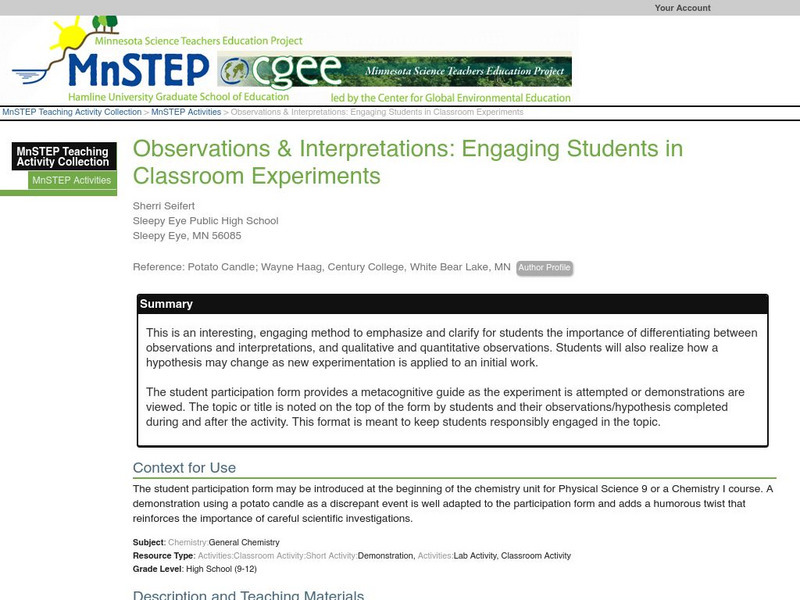Curated OER
1968: Year of Social Change and Turning Point in Vietnam and the United States
Eleventh graders examine the year 1968 in Vietnam and the United States. They work together to research events which they create a timeline. They also read primary source documents of veterans of the Vietnam War.
Curated OER
Layering the Air
Young scholars study the layer of the atmosphere. In this activity on the atmosphere, students discuss the composition of the air around us and how the atmosphere was formed. Young scholars create a scale model of the layers of the...
Curated OER
Observing Sea Ice
Students study and observe types of sea ice found in Alaska. In this sea ice lesson, students use the student network for observing weather to study the different types of sea ice. Students study sea ice depicted in Alaskan art.
Curated OER
Cosmic Collisions and Risk Assessment
In groups, young scholars create their own scientific impact experiments using ordinary materials, and observe and measure results with a variety of impacting bodies and velocities.
Curated OER
Revised “Understanding Nutrition” Activity
Students evaluate their current food choices. In this health science lesson, students test different drinks to rate the amount of Vitamin C content. They discuss results in class.
Curated OER
Exploring the Landscape
Students determine the monotonicity and concavity properties of a function, then apply the First Derivative Test and draw conclusions about the first and second derivatives from these properties.
Curated OER
Wh0-o-o-o's Out There?
Fifth graders describe the physical features of an owl and identify survival adaptations. They Investigate an owl's niche in an ecosystem. The students participate in an interactive puzzle on the internet that helps for motivation.
Curated OER
Electroplating for Corrosion Protection: Redox in Action
Students define what a redox reaction is. In this chemistry lesson, students electroplate some wires in the lab. They research the application of electroplating in the real world.
Curated OER
Chemical Bonding
Eighth graders identify the three main types of chemical bonds. In this chemistry lesson, 8th graders draw Lewis dot diagrams of elements and determine the bond formed. They create a model water molecule.
Curated OER
Introduction to Ecology
Eighth graders identify the living and nonliving components of an ecosystem. In this ecology instructional activity, 8th graders explain the role each organism plays. They participate in class discussion and answer a quiz at the end...
Curated OER
Introduction to Biomes
Eighth graders identify the different kinds of biomes. In this life science lesson, 8th graders explain their importance in an ecosystem. They take a BrainPop quiz at the end of the lesson..
Curated OER
Ecology: Adaptations
Eighth graders identify different types of adaptation in organisms. In this biology instructional activity, 8th graders explain how adaptation help organisms survive. They complete a worksheet at the end of the instructional activity.
Curated OER
Observing Bursts from an X-ray Burster
Students study the use of X-ray data to make size and energy estimates of the source and the processes occurring there. They use XTE observations of the object GRO 1744-28 to determine whether bursts occur periodically and the duration...
Curated OER
Inheritance Word Search Puzzle
In this literacy worksheet, students find the words that are related to the concept that is the theme of the word search puzzle.
Thinkport Education
Thinkport: Translating Qualitative & Quantitative Details: Climate Change
In this science-themed literacy lesson, students read for and differentiate between qualitative and quantitative information.
Science Education Resource Center at Carleton College
Serc: Chemical Changes: Reacting an Acid and Base
In this chemistry lab, students will investigate chemical changes that occur when acids and bases react. It is meant to introduce the concepts of chemical changes, gases have mass, conservation of mass, and balancing equations. Students...
CK-12 Foundation
Ck 12: Scientific Method
[Free Registration/Login may be required to access all resource tools.] Describe how the Renaissance period in history changed the approach to science. Identify the steps of the scientific method. Differentiate between the independent...
Khan Academy
Khan Academy: Gravitational Potential Energy & Conservation of Angular Momentum
Predict changes in gravitational potential energy and angular momentum for a system of two masses.
Science Education Resource Center at Carleton College
Serc: Observations & Interpretations: Engaging Students in Classroom Experiments
Use this method to emphasize and clarify for students the importance of differentiating between observations and interpretations, and qualitative and quantitative observations. Students will learn how a hypothesis may change as new...
Other popular searches
- Math Qualitative Change
- Qualitative Change in Growth
- Interpret Qualitative Change
- Algebra Qualitative Change


















